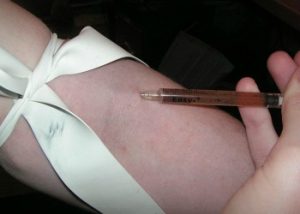Addiction affects people of all walks of life in America. From the youth to the elderly, whether you are a man, a woman, or gay, rich or poor, educated or not, there are different forms of addiction that plague addicts and dominates their lives. Addiction often pertains to vices – smoking, alcohol, prohibited/recreational drugs and even to medicines such as painkillers – but most prominent of all is drugs, leaving people unable to function normally in its absence but more so when they are high.
 The lives of these addicts are crippled and devoid of opportunities to start anew. But in as much as we loathe addiction, there are fewer stigmas surrounding it, but it is still there. Help is now available if they only learn to acknowledge that they need help in the first place.
The lives of these addicts are crippled and devoid of opportunities to start anew. But in as much as we loathe addiction, there are fewer stigmas surrounding it, but it is still there. Help is now available if they only learn to acknowledge that they need help in the first place.
“You know, man, I’m in this place where part of me hesitates to tell my story because of concerns about reputation and my business and all that, but at the same time, this is just who I am. It’s who I am to want to help people. That’s what this is about. Addiction doesn’t have the stigma that it had ten years ago, but it still has a stigma. A lot of people think that it’s a moral failure, and it might be that with some people, I don’t know. That was part of it for me. I did bad shit. I lied. I treated people wrong. I took advantage of people. I was ungrateful. I was inconsiderate… all that stuff. I was a nasty person. But, the thing that was fueling all that was what I know today as the sickness of addiction- that I was obsessed with doing drugs and getting more drugs. Anyone that slowed me down or got in my way, family events, Christmas, whatever, it was just ‘Get the fuck off me, I’ve got to go.’”
Addiction and substance abuse are a problem not only in Macon, but in towns all across the country. The Surgeon General’s report describes this chronic illness as “the use of alcohol or drugs in a manner, situation, amount, or frequency that could cause harm to the user or to those around them. Alcohol and drug misuse and related substance use disorders affect millions of Americans and impose enormous costs on our society. In 2015, 66.7 million people in the United States reported binge drinking in the past month and 27.1 million people were current users of illicit drugs or misused prescription drugs.”
(Via: http://11thhouronline.com/2017/02/16/getting-higher/)
It may be a struggle for addicts to free themselves from their addictions but it is possible.
Research suggests that accurate drug tests during the addiction recovery process can be invaluable tools in fostering recovery and that removing the stigma attached to drug tests may promote addiction recovery.
A study published in the International Journal of Mental Health and Addiction posits that mitigating the stigma associated with drug tests in the clinical setting can promote addiction recovery. Drug tests often carry a number of stigmas, especially when the tests are associated with the legal system or with the workplace, where a positive result might mean legal consequences or a lost job.
Along with other addiction managements, drug testing is a powerful tool to reform addicts or even prevent a relapse.
As laid out by the American Society of Addiction Medicine White Paper, there are numerous therapeutic benefits to clinical drug testing. These include self-report verification: when a patient claims they have not been using their substance of choice, a drug test can be administered in order to confirm the accuracy of the self-report. Among the many additional benefits of drug tests in clinical settings are the monitoring of relapse and the enhancement of motivation for participating in addiction recovery treatment.
(Via: https://www.drugaddictionnow.com/2017/03/11/can-drug-tests-make-addiction-recovery-more-effective/)
Even if help is readily available for adults in big American cities, the opposite can be said in rural areas.
The drug addict in rural America faces special struggles to get help.
Topping the list are the stigma of drug addiction in small towns and lack of transportation to get to treatment centers. Then there are the general problems: not enough treatment centers, lack of money, insurance doesn’t go far enough, and the pharmaceutical companies aren’t playing a big enough role.
And it is a problem that the government needs to address, like any other issues concerning its citizens.
He cited the issues particular to rural America, including the lack of treatment and recovery facilities, transportation problems and the long distances people must drive to access treatment.
He also noted the stigma the addict faces in a small towns where it’s common to know everybody, which, he said, “limits the people’s willingness to come forward and get the help they need.”
“It’s not a character flaw. It’s a disease,” Eschmeyer said.
(Via: http://www.stardem.com/article_931a1361-788d-5cb9-b062-0b8affeb3650.html)
More work is still needed to eradicate the addiction problems in the country. The best recourse is a collaboration between private/ non-profit organizations and the government to reach out to addicts and help them recover from their addictions (through drug rehabilitation centers and psychological support) and lead a normal life once again.
It is a difficult process and may take years but is a necessary step to give these people a new lease on life and cut off their reliance on their addictions. The bottom line is for addicts to acknowledge that they have a problem and to tell the people who care for them that they need help to get out of this situation for once and for all.
An Addict’s Life: Is Help Available? was first seen on The IANAA Blog
source https://www.iamnotanartist.org/an-addicts-life-is-help-available/

No comments:
Post a Comment